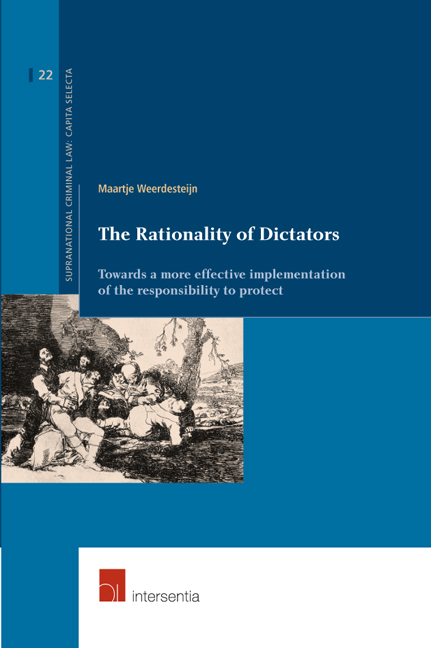 The Rationality of Dictators
The Rationality of Dictators Book contents
- Frontmatter
- Acknowledgements
- Contents
- Chapter 1 Introduction
- Part I The Theory
- Chapter 2 The World of the Dictator
- Chapter 3 Mass Atrocities and the Role of the Dictator
- Chapter 4 Preventing and Stopping Mass Atrocities: the Responsibility to Protect
- Chapter 5 The Interaction between States and Heads of State: the Role of Rationality
- Chapter 6 Different Kinds of Rationality: The Work of Max Weber
- Part II The Comparative Case Study
- References
Chapter 2 - The World of the Dictator
from Part I - The Theory
Published online by Cambridge University Press: 28 September 2018
- Frontmatter
- Acknowledgements
- Contents
- Chapter 1 Introduction
- Part I The Theory
- Chapter 2 The World of the Dictator
- Chapter 3 Mass Atrocities and the Role of the Dictator
- Chapter 4 Preventing and Stopping Mass Atrocities: the Responsibility to Protect
- Chapter 5 The Interaction between States and Heads of State: the Role of Rationality
- Chapter 6 Different Kinds of Rationality: The Work of Max Weber
- Part II The Comparative Case Study
- References
Summary
INTRODUCTION
Dictatorships and dictators are shrouded in secrecy, making them difficult to study. Government sources are usually unreliable and independent media is usually hampered or censured. Studying dictatorial regimes, and how they function, is therefore an extremely difficult task. Unsurprisingly political science has traditionally paid much more attention to democratic countries than their dictatorial counterparts (Ezrow & Frantz, 2011, p. xiv). Interest in the topic, however, has increased and, an impressive body of work has emerged in which dictatorship and democracy are usually treated as each other's counterpart. In the literature, dictatorships are commonly defined negatively as non-democratic regimes (Lidén, 2014, pp. 50-51), but how clearly can we delineate one from the other, and to what extent do dictatorships actually function differently than democracies? Scholars increasingly see the distinction between dictatorships and democracies as a rather fluid one. Democracy and dictatorial rule are now regarded in this approach as either ends of a spectrum, with some regimes being more or less democratic. The distinction is no longer seen as being either black or white, but many regimes are now conceptualised as semi-authoritarian, the so-called ‘hybrid regime’, to denote the different shades of grey (Bogaards, 2009). While this adds to the sophistication of contemporary research, it is important to gain more understanding of what characterizes a dictatorial regime, and how it works. What does the concept ‘dictatorship’ entail and how does it function? To what extent can the dictator actually determine the policies of a country, how influential is he and how does he obtain and maintain such power? These are some of the questions the present chapter seeks to answer in order to explain the dictator's role in determining the policies of his regime, both within his country, as well as the foreign policy of his country.
A factor that complicates answering these questions is the extent to which dictatorships may differ from one another. They may differ, for instance, in the extent to which power is concentrated in the hands of one individual or a small clique, the role the military plays, and the extent to which the regime tries to infiltrate every aspect of people's lives. The leaders of these regimes likewise differ enormously from one another.
- Type
- Chapter
- Information
- The Rationality of DictatorsTowards a more effective implementation of the responsibility to protect, pp. 17 - 54Publisher: IntersentiaPrint publication year: 2016


